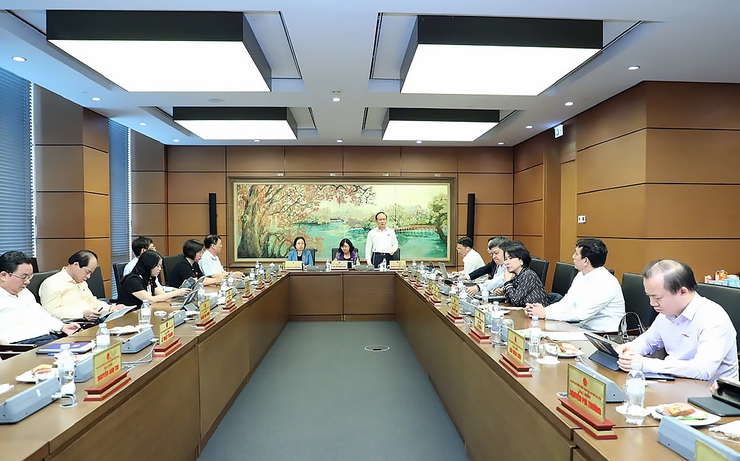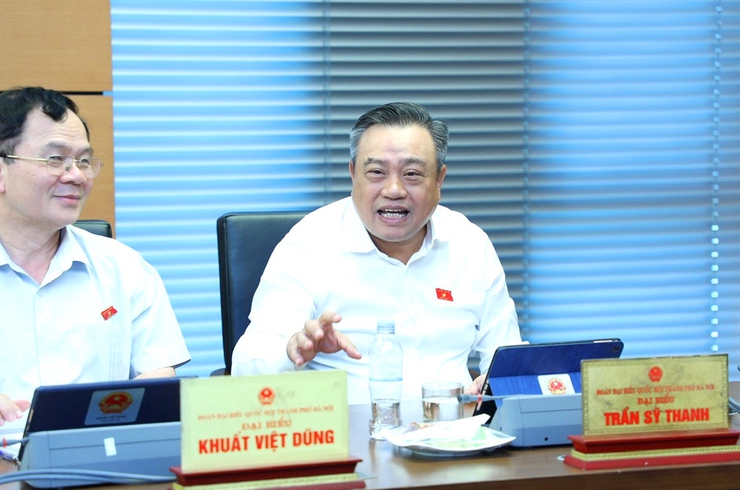Participating in the discussion, National Assembly delegate Tran Sy Thanh, who is Chairman of Hanoi People's Committee, expressed his agreement with the comprehensive amendment of the draft Law on Local Government Organization (amended) and affirmed that the amendment is necessary to timely institutionalize the Party's policy on streamlining the administrative apparatus and organizing local government according to a two-tier model, eliminating the district level.

Overview of the event.
Contributing specific comments, Thanh suggested that the drafting agency pay attention to Article 54 on Transitional Provisions. This draft law sets general provisions for local governments going forward and is not just applicable to the current streamlining process.
However, many provisions will no longer be valid after the organizational restructuring is completed. Therefore, the delegate suggested that these specific contents be included in a resolution, as the law has a long-term nature.
Thanh cited Clause 6, Article 54, which stipulates: "Within 15 days from the date this Law takes effect, the Standing Committee of the People's Council, the agencies under the People's Council, People's Committee, Chairman of the People's Committee, and professional agencies under the district People's Committee must complete the handover of tasks, documents, files, finances, budgets, offices, assets, and other facilities related to competent agencies, organizations, units to ensure the normal, continuous, and smooth operation of the agencies without interruption...".
According to the delegate, this means that from 0:00 on July 1, 2025, when the old administrative units cease operation, there will be 15 days to hand over tasks to the new administrative units.
"So during this period, what will happen to the essential public services for the people? I suggest that the National Assembly's Committees coordinate closely to thoroughly review Clause 6 to ensure that from 0:00 on July 1, 2025, the new administrative units will operate immediately without any legal gaps or disruption of public services," delegate Tran Sy Thanh recommended.
Regarding the number of delegates in the People's Council, the Chairman of Hanoi People's Committee stated that the draft law already specifies this clearly, but delegates are still concerned about the implementation in localities like Hanoi, where the administrative boundaries are rearranged but not fully merged.
The delegate gave an example where an old commune or ward could be divided into two new administrative units, leading to difficulties in determining the number of People's Council delegates. While the Party quickly designates officials with a maximum number, the government has not yet provided clear regulations. "If we merge 4 to 5 communes into one new administrative unit, the number of People's Council delegates may be large, which complicates organization. Therefore, I suggest clarifying this issue to ensure feasibility," said delegate Tran Sy Thanh.
Regarding Clause 2, Article 11, or Clause 2, Article 34 of the draft Law, Thanh mentioned: The draft stipulates that after stabilization, the new People's Council will elect the Chairman of the People's Council and the Chairman of the People's Committee. However, this provision is inconsistent with the Party's policy, which requires the immediate appointment of these positions after restructuring.

Chairman of the Hanoi People's Committee Tran Sy Thanh at the event.
"The inconsistency between the law and the Party's policy may cause difficulties in implementation. I suggest reviewing and adjusting to ensure consistency, possibly eliminating the election provision at this time to align with the Party's directive," said Thanh.
Discussing the draft Law on Civil Servants (amended), Chairman of Hanoi People's Committee Tran Sy Thanh stated that this is an opportunity to facilitate labor exchanges and transitions between the public and private sectors. According to the delegate, institutional barriers are limiting the development between the two sectors.
The gap between the two sectors, which is widening, makes it difficult for public officials to understand social realities, types of business, and economic and cultural activities. This leads to backwardness, rigidity, and a lack of ability to manage and govern complex fields.
Thanh noted that the current system of regulations on civil servant recruitment, with age, experience limits, and exams, is hindering labor mobility.
"If we want to invite a private bank director or a scientist from a private research institute to work for local government, it is very difficult because current regulations do not allow it. On the other hand, public servants after their tenure also find it difficult to move to the private sector to consult or advise, even though they have valuable experience. This lack of exchange is a major barrier to development and improving national governance capacity," the delegate expressed.
Therefore, Thanh suggested that the amendment to the Law on Civil Servants should aim to promote labor mobility, not only to help public officials better understand social realities but also to improve governance efficiency, bringing business, economy, and culture closer to real life. This is a key factor to promote growth and improve national governance.